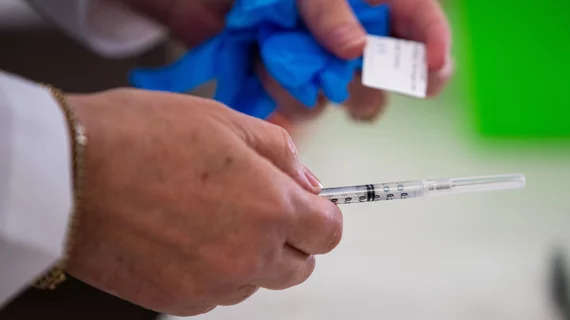COVID-19 vaccines safe for patients with a history of heart damage
Patients who have already had myocarditis may not face a higher risk of developing that same condition again after receiving a COVID-19 vaccine, according to new research out of France.
Dr. Iyad Abou Saleh, a specialist with the Université Hospital of Lyon in France, presented these findings at ESC Acute CardioVascular Care 2022, a scientific congress hosted by the European Society of Cardiology (ESC).
“Our experience shows that in some situations patients have avoided vaccination because they, or their GP, were afraid it could cause another bout of myocarditis,” Abou Saleh said in a prepared statement from the ESC. “We hypothesized that SARS-CoV-2 vaccination would not increase the risk of myocarditis recurrence in patients who had the condition in the past.”
The study’s authors tracked data from 142 patients treated at the same French hospital for acute myocarditis from January 2016 to June 2021. The average patient age was 31 years old, and 79.7% were men. Patients were reached by telephone and asked a series of questions related to their COVID-19 vaccination status.
Abou Saleh et al. confirmed the vaccination status of 71 patients — 55 of those patients were vaccinated and 16 were not vaccinated. Twelve (75%) of the 16 unvaccinated patients said their primary reason for not seeking out a vaccine was the fear of repeat myocarditis.
Looking at data from the vaccinated patients included in this analysis, however, the team found no evidence that a history of myocarditis increased a vaccinated patient’s risk of recurrent myocarditis.
They did note that a majority of patients included in their study received the Pfizer/BioNTech COVID-vaccine. Also, they said, additional research that includes many more patients is still needed.
“These results provide reassuring data that may encourage patients with a history of myocarditis to get vaccinated against SARS-CoV-2,” the authors concluded.
Context on COVID-related myocarditis
Myocarditis, one of the most significant side effects associated with COVID-19, has been seen in a relatively small number of patients after receiving a COVID-19 vaccine. Young men face the highest risk, especially those 30 years old and younger.
Most cases of vaccine-related myocarditis, however, are mild. Specialists throughout the world have emphasized that the benefits of vaccination far outweigh the risks.
Also, some differences do exist between traditional myocarditis and vaccine-related myocarditis. Symptoms typically resolve faster with vaccine-related myocarditis, for example, and treatment typically only includes pain management.
Related COVID-19 Content:
Losartan fails to improve lung injuries in hospitalized COVID-19 patients
Myocarditis, arrhythmias and more: An updated look at what cardiologists know about long COVID-19
‘We learned that lung recovery was actually possible’: ECMO’s impact on COVID-19 patients in the ICU
Telehealth provided value for heart failure patients during COVID-19 pandemic
Congenital heart disease increases risk of poor COVID-19 outcomes, including death

